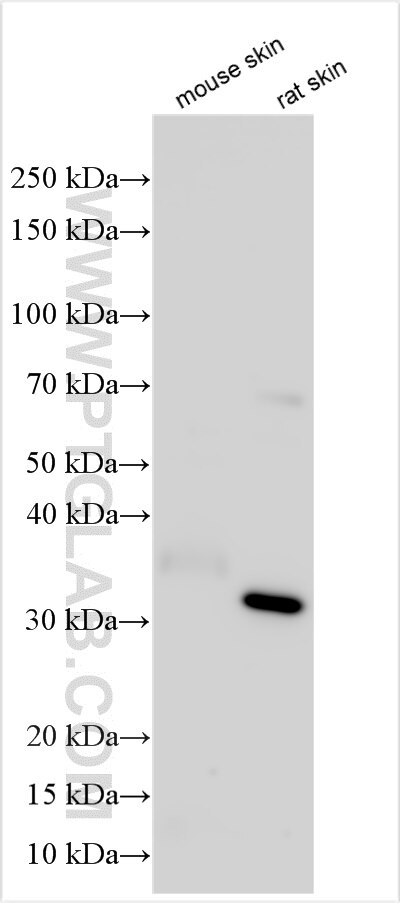Anticorps Polyclonal de lapin anti-CASP14
CASP14 Polyclonal Antibody for WB, ELISA
Hôte / Isotype
Lapin / IgG
Réactivité testée
Humain, rat, souris
Applications
WB, ELISA
Conjugaison
Non conjugué
N° de cat : 28136-1-AP
Synonymes
Galerie de données de validation
Applications testées
| Résultats positifs en WB | tissu cutané de souris, tissu cutané de rat |
Dilution recommandée
| Application | Dilution |
|---|---|
| Western Blot (WB) | WB : 1:1000-1:6000 |
| It is recommended that this reagent should be titrated in each testing system to obtain optimal results. | |
| Sample-dependent, check data in validation data gallery | |
Informations sur le produit
28136-1-AP cible CASP14 dans les applications de WB, ELISA et montre une réactivité avec des échantillons Humain, rat, souris
| Réactivité | Humain, rat, souris |
| Hôte / Isotype | Lapin / IgG |
| Clonalité | Polyclonal |
| Type | Anticorps |
| Immunogène | CASP14 Protéine recombinante Ag27242 |
| Nom complet | caspase 14, apoptosis-related cysteine peptidase |
| Masse moléculaire calculée | 242 aa, 28 kDa |
| Poids moléculaire observé | 35 kDa |
| Numéro d’acquisition GenBank | BC069541 |
| Symbole du gène | CASP14 |
| Identification du gène (NCBI) | 23581 |
| Conjugaison | Non conjugué |
| Forme | Liquide |
| Méthode de purification | Purification par affinité contre l'antigène |
| Tampon de stockage | PBS avec azoture de sodium à 0,02 % et glycérol à 50 % pH 7,3 |
| Conditions de stockage | Stocker à -20°C. Stable pendant un an après l'expédition. L'aliquotage n'est pas nécessaire pour le stockage à -20oC Les 20ul contiennent 0,1% de BSA. |
Informations générales
Caspase14 belongs to the caspase family of cysteinyl aspartate-specific proteinases that frequently play a central role in apoptosis. Caspase14 exist as inactive proenzymes that undergo proteolytic processing to produce large and small subunits (p20 and p10) at Ile152/Lys153 residues, which is different to other caspases (Asp residue). Caspase14 plays a role in protein maturation of filaggrin, and possibly in DNA repair. Overexpression of Caspase14 has been detected in several of epithelial malignancies, indicating that Caspase14 could play a role in carcinogenesis and disease progression of cancers. Caspase14 can binds the apoptosis-inducing factor (AIF) indicating that caspase14 may be an anti-apoptotic protein. In the LADC specimens, two bands can be detected with MW of 35 kDa and 37 kDa which represent Caspase14 and the phosphorylated Caspase14(pCasp-14) respectively. (PMID:21567094, 12200134, 10203698, 17515931, 16061209). This antibody can recognise all the forms of Caspase14.
Protocole
| Product Specific Protocols | |
|---|---|
| WB protocol for CASP14 antibody 28136-1-AP | Download protocol |
| Standard Protocols | |
|---|---|
| Click here to view our Standard Protocols |


